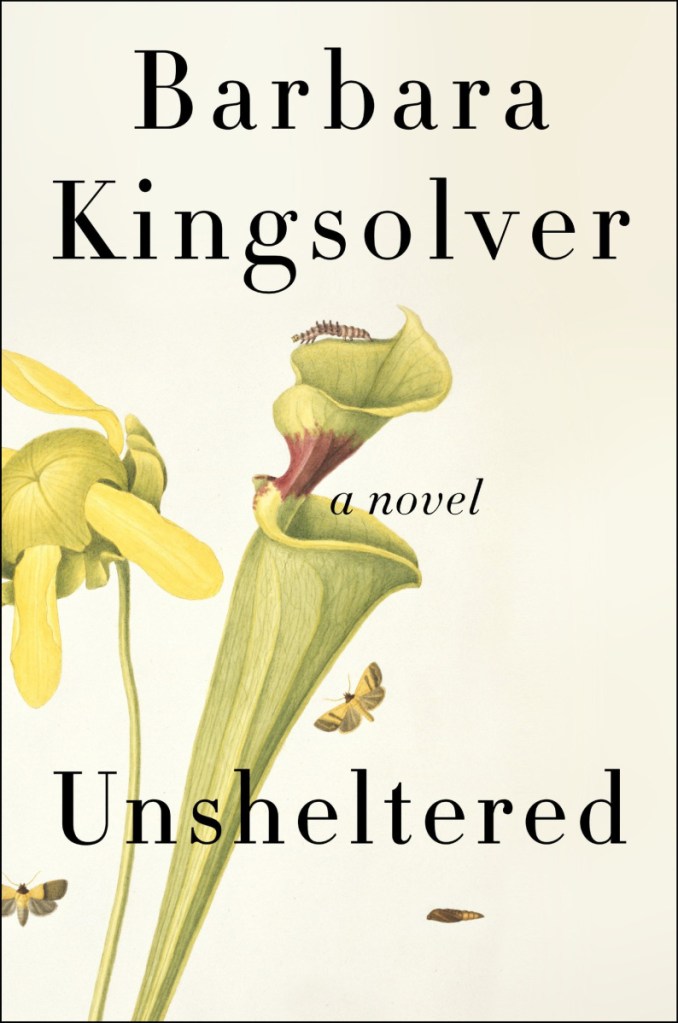A few years ago, I bought floral wallpaper covered in flowers and vines and Venus flytraps and ants. Designed by a small company called Grow House Grow, the name of the pattern was “Ms. Treat.” The design was inspired by Mary Treat, an American scientist in the late 19th century. Treat’s work is forgotten, but she was a specialist in carnivorous plants, published several books and influenced the work of Charles Darwin. Who was she? And why did I only learn about her because of a wallpaper design?

Barbara Kingsolver
So thank God for Barbara Kingsolver, one of America’s hardiest novelists (“The Poisonwood Bible,” “The Bean Trees,” etc.), who has also stumbled upon the lost history of Treat. Kingsolver went into the archives and got her hands on Treat’s papers and correspondence with Darwin, emerging with “Unsheltered,” a gripping novel of two multigenerational households set in Vineland, New Jersey. There’s the 19th-century Greenwood family, and the contemporary household overseen by Willa Knox – who has moved to Vineland in the year approaching Donald Trump’s election. Both households find themselves in poorly constructed dwellings on faulty foundations, during a time of sweeping cultural and historical change.
Mary Treat is the next-door neighbor of the fictional Greenwood family. It’s the late 1860s, and the planned community of Vineland is confronting cultural shifts it wasn’t prepared for. Thatcher Greenwood, a local teacher, is intrigued by his new neighbor, who he at first takes for an eccentric before realizing she’s a respected scientist whose knowledge far surpasses his. Treat is a clear-eyed, stalwart savant, while Greenwood hesitates to risk his job and livelihood when pressed to present Darwin’s theory to the small town. Across the country, Darwin’s theory has people retreating to the pulpits of blustery unscientific men. “I suppose it is in our nature,” Treat explains. “When men fear the loss of what they know, they will follow any tyrant who promises to restore old order.”
In the current day, Willa Knox is a former editor turned freelance writer who inherits a crumbling Victorian manor on brink of collapse and moves in when her professor husband’s university folds and he finds a low-paying contract at a nearby college. Willa’s adult children return home soon after. Her son, Zeke, is struck by tragedy when his wife, the mother of his newborn son, kills herself – an effect of dropping her anti-depressants to protect her developing fetus. Her daughter, Tig, has returned from her off-the-grid adventures in Cuba. She’s the millennial of the household, and the other soothsayer of the novel – an Occupy Wall Street graduate with radical opinions about the impending climate crisis, the impending risk of Trump and the limitations of a capitalist democracy. There’s Nick, Willa’s father-in-law, a former union worker who wrongfully blames immigrants and African-Americans for the erosion of his job security and his piece of the pie. His health is failing, and the family insurance isn’t covering care. Throughout, Zeke’s baby coos happily in the background, though his future is the most tenuous.
Kingsolver ably navigates the problematic white privilege of the family, which is refreshing to read in a contemporary novel about white middle-class issues, and shows us a family struggling to wake up to the fact that their lives were built on presuppositions and entitlement, while at the same time portraying a very clear crisis confronting many. There’s not enough money to cover costs, and there’s no job security on the horizon. They register for Obamacare, and Willa problem solves for every person in her family, while barely holding herself together.
Willa has set her hopes on discovering the origins of her falling-down house and finding some significant history that can help her access grant money – which leads her to the discovery of Ms. Treat. One way Kingsolver suggests that we move forward in this new unsteady present is to study and own our past. Unacknowledged histories and work abound. By the end of “Unsheltered,” houses aren’t saved, but there are interesting directions to go, and so Willa is on a mission to write a biography of Mary Treat and her contributions to science. Here’s hoping that someone will take up Kingsolver’s suggestion and write Treat’s biography outside the pages of a novel.
Send questions/comments to the editors.


